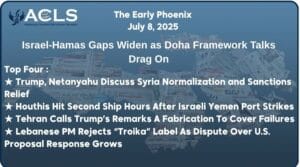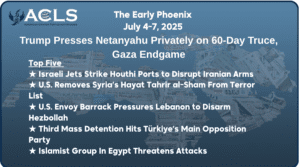Israel at a Crossroads: Biden’s Peace Push, Ceasefire Strains, and Musk’s Diplomatic Foray
- Biden Administration Reaffirms Commitment to Two-State Solution in Middle East.
In light of the study on reassessing U.S. strategies in the Middle East, the recent statement by U.S. National Security Adviser Jake Sullivan gains significance. Sullivan confirmed President Biden’s administration’s dedication to a two-state solution for Israeli-Palestinian peace. This commitment aligns with the study’s emphasis on resolving the Gaza conflict through political means and strategic regional cooperation. The administration’s stance also resonates with the study’s call for a balanced approach to Middle Eastern affairs, including the Israel-Palestine issue, which is pivotal for regional stability and U.S. interests.
- Netanyahu and Hamas Grapple with Ceasefire Complexities as Israel Targets Hamas Leadership in Gaza Operations.
Israeli Prime Minister Netanyahu briefed President Biden on potential resumption of military operations in Gaza after the ceasefire, while also considering continued prisoner releases. Concurrently, Hamas is advocating for an extension of the ceasefire, to secure additional prisoner releases.
The temporary truce in Gaza is proving challenging for the Israeli army. Israel, citing security concerns in combat zones, is restricting the movement of Palestinians attempting to return to the northern regions. This restriction is aimed at maintaining Israel’s military effectiveness but is complicated by the return of civilians, increasing the likelihood of unintended harm. There is concern among Israeli officials and analysts that Hamas could use this period of ceasefire to disrupt Israel’s military plans and rebuild its capabilities. Additionally, the terms of the ceasefire, including hostage exchanges, present Israel with operational challenges, amidst fears of losing military advantage and facing global pressure for more comprehensive agreements. The situation is particularly complex in northern Gaza, an area significantly affected by the conflict.
Sinwar, playing a significant role in prisoner exchange decisions, has personally visited Israeli detainees in a tunnel in Gaza, reassuring them in Hebrew about their safety. During this ceasefire, the Israeli military faces challenges such as the return of displaced Palestinians and maintaining military readiness.
Despite temporary ceasefires, Israel’s offensive, especially in Khan Yunis, continues. The IDF and Shin Bet have significantly disrupted Hamas’ strategic capabilities by eliminating five senior commanders.
The ongoing Israel-Hamas prisoner exchange, coinciding with a 4-day truce in Gaza, has seen a rise in Palestinian detainee numbers and fatalities in the West Bank. Military spokesman Avichay Adraee and Chief of Staff Hertzi Halevi have said the Israeli forces will resume their operations against Hamas following the prisoner exchange. Amidst these tensions, a significant UN aid delivery to northern Gaza addresses urgent needs, highlighting the complex interplay of military action, diplomatic negotiations, and humanitarian concerns in the region.
- Qatar Engages in Israel-Hamas Hostage Negotiations During Truce Discussions.
Qatari intelligence officers are currently in Israel, discussing the Gaza truce and a complex hostage situation, despite the lack of official diplomatic relations between the two nations. As part of the proposed extension of the Gaza truce, Israel has set a “one-for-three” release condition, offering to exchange 40 Israelis for 150 Palestinian prisoners. This agreement, mediated by Qatar, Egypt, and the U.S., follows Israel’s release of 78 Palestinian prisoners and Hamas’ release of 26 Israelis and 15 non-Israeli foreigners. Israel has confirmed that approximately 240 captives were taken during a Hamas attack.
The 13 Israeli captives released from Hamas captivity in Gaza after the October 7 attack have recounted their experiences, describing harsh conditions but no physical torture. They reported days without food, limited bathroom access, and frequent relocations, sleeping on benches.
Qatari Prime Minister Sheikh Mohammed bin Abdul Rahman Al Thani, in an interview with the Financial Times, stated that Hamas denies capturing civilians during the recent conflict, attributing this to other armed groups. He revealed that over 40 women and children are still detained in Gaza, but not by Hamas. This statement, however, contradicts the known facts of the October 7 attack, where all forces involved were under Hamas’ command. Israel, in response to Qatar’s claims, provided a list of over 90 captives and indicated readiness to prolong the truce if more detainees are released by Hamas. This development suggests a complex coordination between Hamas and the Palestinian Islamic Jihad Movement in resolving the hostage situation.
An Israeli captive, Daniel Aloni, in a farewell letter to Al-Qassam Brigades, expressed gratitude for the humane treatment received during captivity, acknowledging kindness towards her daughter, Emilia. IDF Spokesperson Rear Admiral Daniel Hagari mentioned gathering information from each captive to understand their individual experiences, though this information will not be publicly released.
- The Harrowing Plight of Women and Captives in Gaza.
In Gaza, amidst the ongoing conflict, pregnant women face a severe health crisis. Out of 540,000 women of childbearing age, 50,000 are pregnant and grappling with inadequate health services. The World Health Organization has raised alarms about increased maternal mortality due to insufficient care, with the war exacerbating the situation, leading to heightened stress, fetal deaths, premature births, and unanesthetized cesarean sections. The release of Maysoon Musa Al-Jabali, the oldest female Palestinian prisoner, along with 33 children in a Hamas-Israel exchange deal, highlights the harsh conditions Palestinian detainees face in Israeli prisons, especially since October 7th, including allegations of beatings, gas attacks, and severe food scarcity.
Conversely, the experiences of 13 Israeli captives held by Hamas in Gaza present a different aspect of the conflict. During their 49-day captivity, they endured isolation, scarce food supplies leading to significant weight loss, and harsh living conditions. Meirav Raviv, a relative of some hostages, shared their struggles, including days without food, long waits for bathroom access, and frequent relocations in small cars. The psychological and physical toll on these hostages was profound, as they were isolated from the outside world until their release under the same exchange agreement.
Both narratives, though distinct in context and perspective, underscore the human cost of ongoing conflicts. The ordeal of the Israeli hostages, detailed by IDF Spokesperson Rear Admiral Daniel Hagari, emphasizes the importance of individual testimonies in understanding the complexities of captivity. The release of these captives marks the end of a distressing chapter for their families, but the broader narrative of captivity and its consequences continues to unfold in the region.
- Elon Musk’s Israel Visit: Addressing Anti-Semitism and Starlink’s Role in Gaza.
As we conclude this week’s analysis, a notable yet distinct development emerges. Elon Musk, amidst allegations of anti-Semitism on his social media platform, is scheduled to meet with Israeli President Isaac Herzog. This meeting aims to tackle the pressing issue of online hate speech. Additionally, Israel’s agreement with Musk ensures that Starlink’s operations in Gaza will proceed only with Tel Aviv’s approval. Musk’s visit, aligning with his public stance against anti-Semitism, unfolds during a temporary ceasefire in the Israel-Hamas conflict, marking a significant, albeit different, point of interest in the region’s ongoing narrative.
======================
Follow the latest news from the American Center for Levant Studies via Google News
📢 In case you missed it,
📰 The Early Phoenix Nov 24, 2023
📰 The Early Phoenix Nov 23, 2023
📰 The Region November 22, 2023
📰 The Region November 21, 2023
📰 The Region November 20, 2023



